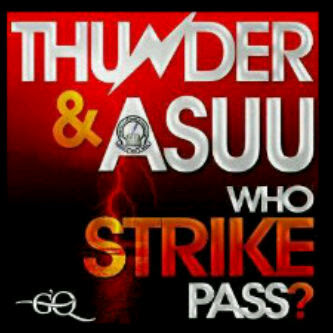When on 29th June 2013 the national body of the Association of Staff Union of Universities (ASUU) announced and mandated that university lecturers across the country ‘down tools’ as the last resort to the quiet negotiations between the body and the federal government, many thought it would be a run-of-the-mill kind of issue. The resolve to go on strike came after the body’s National Executive Committee meeting at the OlabisiOnabanjo University (OOU), Ago-Iwoye, Ogun State. Now in the third month, the strike action is still breathing down with venom on the nation’s education system and of course, the nation at large.
A strike usually takes place in response to employee grievances. It is seen as a deviant move to make agitations and complaints known to a higher authority like the state. Strikes became important during the Industrial Revolution, when mass labour became important in factories and mines. Most western countries partially legalized striking in the late 19th or early 20th centuries. Strikes those days are sometimes used to pressure governments to change policies.
The current indefinite strike embarked on by ASUU is not without cogent reasons, though. Usually the educational bodies in Nigeria embark on strikes over agitations ranging from improved salaries, allowances, to infrastructural development of universities and other tertiary institutions. However, part of the bone of contention for the current one is as a result of an agreement government reneged on. This agreement was reached in 2009 when the ASUU body embarked on their last strike action. Some of the issues included the Academic Earned Allowances, to be paid to lecturers for excess work load and allowance for supervision of post-graduate programmes, government’s apparent non-challant attitude to issues of university education in Nigeria (infrastructural development, conducive learning environments, adequate research grants and incentives), because most of the people in government do not have their children in Nigerian universities.
Moreover, considering the spill-over from such strikes the question is: is this the best method of resolving conflict? Not only is the strike taking a toll on the general academic and educational system of the country but also the students themselves and their immediate families are at the receiving end of the line. Reports from various quarters in the country are beginning to bemoan the increasing rate of crimes and youth unrest and attribute same to the feud between ASUU and the Federal government.
Agreed, conflict is a normal part of human existence. It is also a normal part of any healthy relationship; for when conflicts arise, parties are given opportunity to discover faults and shortcomings from the other and when conflicts are resolved, it makes for a better working relationship between both parties. However, it is our opinion that there could be more workable means of resolving this disagreement between the government and the Association of Staff Union of Universities. Experts have continued to suggest that the best way to resolve conflicts in employee-management relations is through collective bargaining and joint consultation between the management and representatives of labour. Strike action as the last resort when negotiations fail simply derives from anger, resentment, rebellion, pettiness and if you like, selfishness. Though strike actions have always gotten the attention of government in the past and possibly made them rethink on their stand, yet considering the popular saying that “when two elephants fight, it is the grasses that suffer”, trade unions and professional associations should rescind their constant decision to resort to strike action. For one, it makes them appear weak and vulnerable and leaves a trail of bad news behind. Collective bargaining presupposes that both parties in a conflict are seen as mature, responsible and selfless in trying to resolve any clashes of interest.
Everyone wants to be understood, nurtured and supported. And this understanding, nurture and support can only come through adequate communication between the parties. Therefore, communication is central to the resolving of conflicts. This can only be motivated through collective bargaining. Rather than the high-horse kind of negotiation between the Federal government and ASUU, both parties should begin to listen more to each other than in dishing out their own points of view. For the on-going strike to be over, both parties should in the interest of the nation, the educational institution, the wasting Nigerian students and the image of the nation, begin to listen to themselves, look beyond themselves and find common grounds of agreement rather than insisting on each other’s ways. This can only continue to elongate the matter and not lead us anywhere. One sure question for both the Federal government and ASUU is: how can we hope to compete in the global marketplace if Nigerian students cannot boast of consistent, quality education? The education of our youth should be a priority not an option; and strike action can never be the last resort when such priority is sought-after.
•Uzuegbunam wrote in from Awka , Anambra state.

